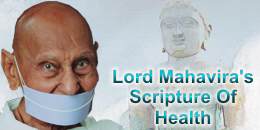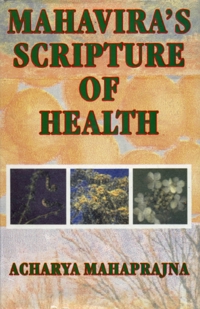
The fifth component of human existence is the mind. The mind is everything and yet it is nothing. There is no permanent existence of mind. When the mind is in existence, it is everything. It is nothing if we do not make use of it. The mind is not something permanent like the enduring emotions. The mind is created and it also vanishes. We can create the mind any time we wish, and also give it rest whenever we want. The mind has several states. The mind can be fickle, restless and it can concentrate. This is the samanska (Sanskar) state. But when there is the mind, lots of things happen. Therefore, health is related to the mind. If the mind is healthy, then the body is healthy too. If the mind becomes unhealthy, then the body becomes unhealthy too.
Acharya Malayagiri has reflected deeply on this subject in his commentary on the Nandi Sutra. A person, who gets his desired and nourishing meals, develops a strong and robust body. If he gets the meals that he does not relish and which do not give nourishment, his body becomes languid and diseased. Similarly, when the mind thinks about good things and reflects about good and positive things, it absorbs desirable components of matter which make the mind cheerful and this body becomes healthy. As against this, when a man has bad thoughts in his mind, imagines bad things and he is overcome by bad memories, he absorbs undesirable particles of matter which make his mind diseased and his body becomes unhealthy. The body and the mind have a great impact on each other. It has been said that the mind would be healthy if the body is healthy. It can also be said that the body would be healthy if the mind is healthy. As a matter of fact, the second view is more decisive.
Now the question is: how can mental health be maintained? What kind of desirable matter should the mind keep on absorbing? It is generally believed that we are thinking, but from the philosophical point of view it can be said that we cannot make the slightest forward movement without absorbing the matter related to manovargana (Grouping of components of matter to the activity of the mind). Just as the matter related to the vital energy pervade the entire universe, the matter related to manovargana governing the functioning of the mind, also permeate the entire universe. Those components of matter are both desirable and undesirable. This means that those components of matter related to manovargana whose colour, smell, taste and touch are favourable are desirable and those whose colour, smell, taste and touch the unfavourable are undesirable. When there are good thoughts in the mind, desirable components of matter are absorbed, the mind becomes cheerful and the body also becomes healthy. Whenever there are bad thoughts in the mind and it is overcome with jealousy, quarrel and condemnation and when thinks about pulling down other people, he absorbs undesirable components of matter. This complicates the problems of the mind and the body also becomes unhealthy.
There are two words which are extremely important in the context of the mind are:
- Satya Manayoga (tendency of the mind pertaining to truth) and
- Asatya Manoyoga (the tendency of the mind in relation to untruth).
When we exercise mental powers for discovering truth, or the mental activity is concerned with reality, then that concentrated activity is oriented to truth. Whenever we exercise our mind in thoughts related to untruth, it is concentration - oriented to untruth. Concentration - oriented to truth acts such as a medicine for mental health. It is a tonic both for the body and the mind. When tendency of the mind in pertaining to untruth, it leads to the depletion of both - the physical and mental powers. Depletion of mental strength is a major problem now-a-days. Man is also a victim of mental tension. If the mind works towards discovering the truth then we can find a way to free ourselves from these problems.
 Acharya Mahaprajna
Acharya Mahaprajna

